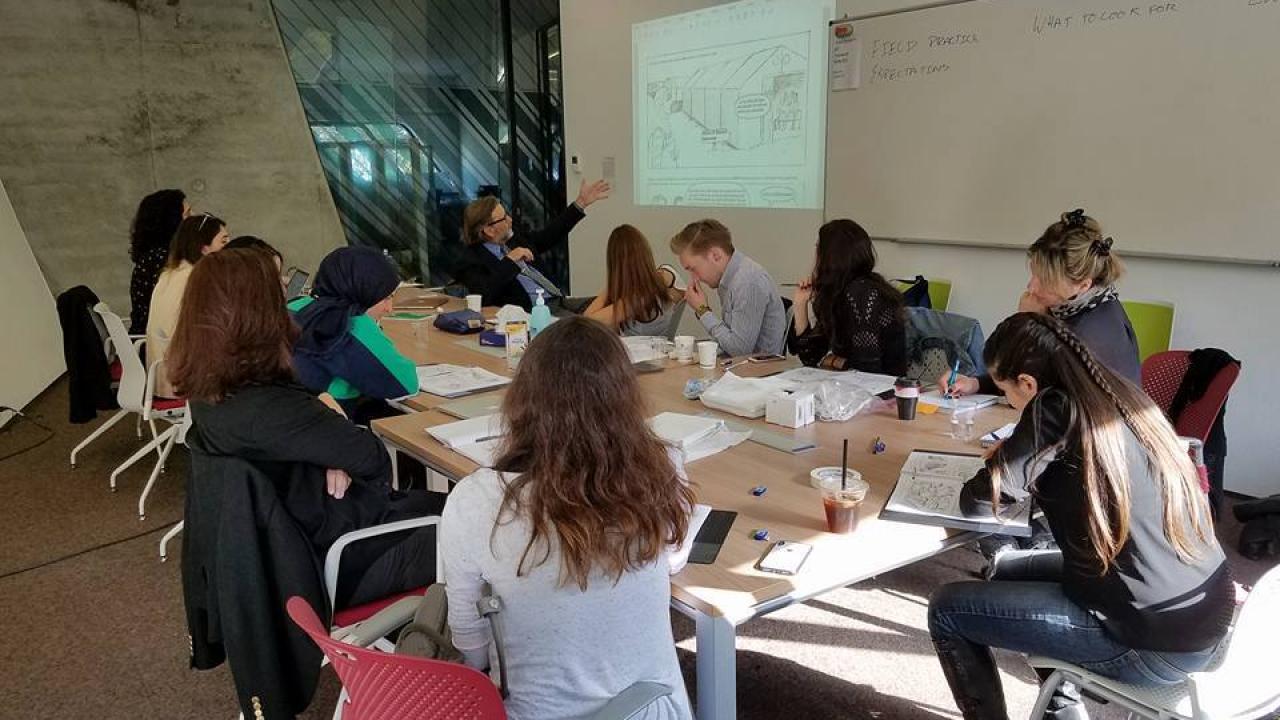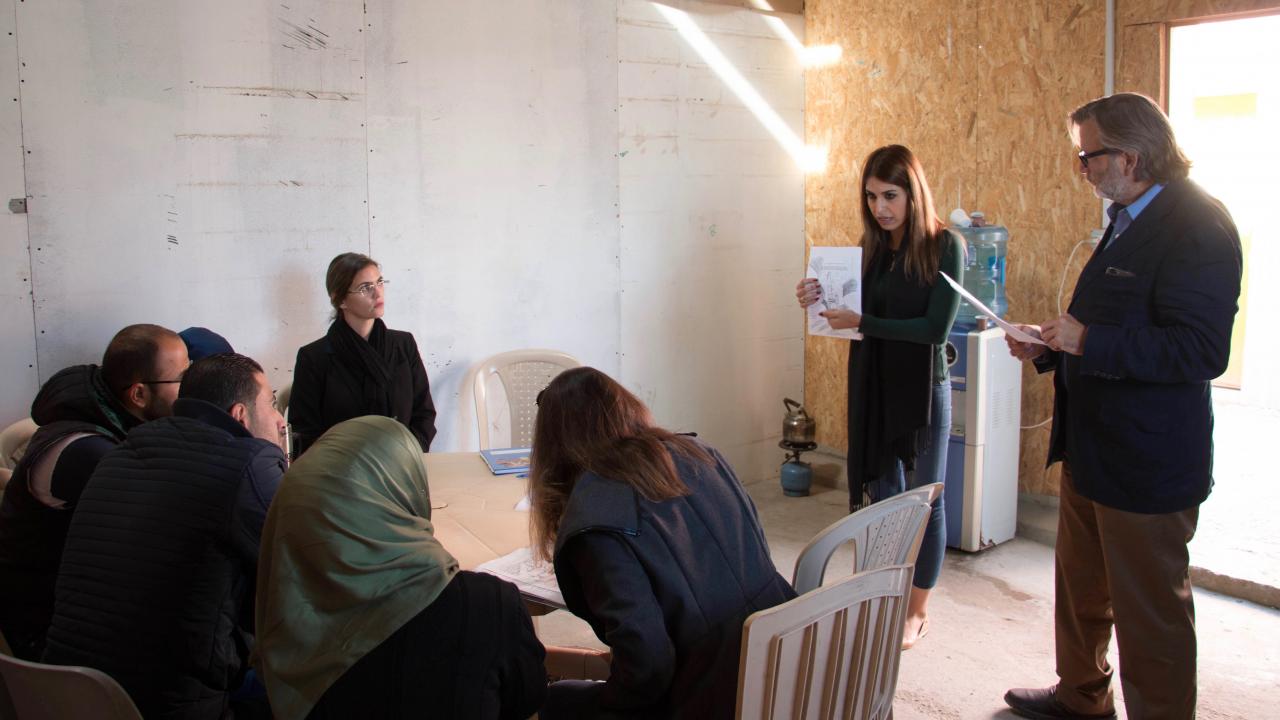Helping Refugees Reclaim Right to Education
Ukrainian students, professionals and human rights advocates are encouraged to use the Article 26 Backpack to safeguard academic documents, diplomas, transcripts, professional certificates and credentials, and other sensitive materials from loss. View the Ukrainian Backpack Flyer.
- Article 26 Backpack is available in Dari/Farsi, Arabic, English, French and Spanish.

About Article 26 Backpack
Made to address the social and institutional barriers that arise as refugees and vulnerable young people attempt to continue their education or gain employment, the Article 26 Backpack is a universal human rights tool that empowers academic and employment mobility. The project, which is backed by a Ford Foundation Grant and donations to the Article 26 Backpack Excellence Fund, is poised to revolutionize the way refugees and those whose education has been disrupted by war, natural disaster, or economic collapse shape, store and share elements of their professional and educational identity. At its core, it provides them with a way to safely store and share with universities, scholarship agencies, and even employers their educational background, employment history, professional achievements and goals. The Backpack builds pathways of connection and inclusion for all, especially refugee and at-risk young people.
Access the Article 26 Backpack Tool
Article 26 Backpack is named in accordance with Article 26 of the Universal Declaration of Human Rights, which asserts everyone’s right to education. The project is led by Keith David Watenpaugh, professor and director of Human Rights Studies and housed in UC Davis Global Affairs. Building the Backpack and getting it into the hands of young people in need has brought together an international and multidisciplinary team including:
- University of California, Davis
- American Association of Collegiate Registrars and Admissions Officers
- Issam Fares Institute for International Affairs and Public Policy at the American University in Beirut

Why Now?
Imagine you’re a young university student from Syria. You and your family have had to flee war and violence; you’re about to start down an unknown and difficult path, and you’ve been studying to go into medicine or engineering or teaching, and you want to keep going.
Once in the safety of Lebanon, Jordan, Turkey or Greece, and like hundreds of thousands of other young people, you try to reconnect with higher education, but now you face a host of new problems. For instance, do you have an “official transcript” if you’re a refugee and the university you attended is closed or has been destroyed?
Having documents like this—and sharing the information they contain—can be the difference between being able to reconnect with higher education and building a better future for yourself and your family or being left behind.
Article 26 Backpack is designed to solve challenges like these for refugees and other populations of vulnerable young people by empowering them to best share with universities, scholarship agencies, and even employers their educational background, employment history and goals.
Among its many capabilities, the Backpack is a mechanism to safely store, share, and have evaluated documentation of transcripts, diplomas and other forms of certification. Much more than just “an app”, the project creates an ecosystem that makes it possible for refugee and other at-risk young people to connect with those institutions, programs and employers that can best help them.
UC Davis, partnering with the American Association of Collegiate Registrars and Admissions Officers and the American University in Beirut is first developing, implementing and evaluating the Backpack with refugees and at-risk young people in Lebanon.
From there, the Article 26 Backpack will be developed for broader implementation throughout the Middle East, particularly in those areas most affected by the war in Syria, but also beyond the region to bring the tool to even larger numbers of young people.
Access the Article 26 Backpack Tool
My Story/My Future
Using techniques borrowed from humanities field of "digital storytelling," the Article 26 Backpack gives refugee young people a chance to record and upload an oral statement of purpose, "My Story/My Future."
The short videos also provide a way to bring a human face to the often dry academic documents that are contained in Backpacks. Jihad's "My Story/My Future" is especially moving—as he was imprisoned and tortured while a college student—but not unique.
Student Internship
This internship is an opportunity for students to practice Human Rights advocacy and make a real difference in the lives of more than three million refugee and displaced university students worldwide. Interns will be assigned to focus on one or more of the following projects.
- Digital/Social Media Promotion Strategy
Interns will develop, implement, and gauge the effectiveness of a multi-lingual campaign using social/digital media to make refugee/displaced communities aware of the Backpack, eligibility, and potential uses. Interns will also build links with university-based refugee outreach programs in areas of need. Interns with language capabilities in English, Arabic, French, Spanish, and Persian/Dari are needed for this project.
- Backpack Guide Educational Materials Development
Interns will work with media team on the development of multimedia digital tools, including recorded demonstrations of how to use Backpack that will help users effectively connect with the ecosystem without further assistance. Interns with language capabilities in English, Arabic, French, Spanish, and Persian/Dari.
- Backpack Digital and UX support
Interns will work with Information and Education Technology (IET) on the support of the Backpack’s digital infrastructure, update and improve site appearance, answer questions, and produce data and statistics as need by Backpack director and designated others.
Academic Credit
During the academic year, this internship is for academic credit (2-4 units/quarter) Interns will receive academic credit from the Human Rights Studies Program. There is a possibility that a limited number of paid internship positions may be available during the summer.
Eligibility
This internship is open to current UC Davis undergraduate students. Students should have some training in Human Rights Studies and be prepared to follow principles of civilian protection. Foreign language ability is preferred. Students pursuing the Minor in Human Rights Studies and those looking to use or further develop their foreign language skills are especially welcome.
Application Process
One-page letter of interest stating qualifications and internship areas of interest and short CV; and contact information for one reference. Please submit all application materials to: Professor and Director of Human Rights and Director of Article 26 Backpack, Keith David Watenpaugh, at kwatenpaugh@ucdavis.edu. Applications will be reviewed on a rolling basis.
Contact Information

Keith David Watenpaugh
Director of Article 26 Backpack
Global Affairs
Professor and Director of Human Rights Studies
College of Letters and Science
(530) 752-0470
kwatenpaugh@ucdavis.edu
